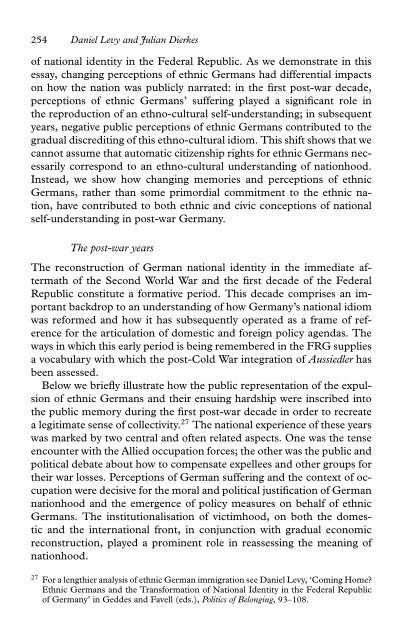Memory and Power in Post-War Europe: Studies in the Presence of ...
Memory and Power in Post-War Europe: Studies in the Presence of ...
Memory and Power in Post-War Europe: Studies in the Presence of ...
Create successful ePaper yourself
Turn your PDF publications into a flip-book with our unique Google optimized e-Paper software.
254 Daniel Levy <strong>and</strong> Julian Dierkes<br />
<strong>of</strong> national identity <strong>in</strong> <strong>the</strong> Federal Republic. As we demonstrate <strong>in</strong> this<br />
essay, chang<strong>in</strong>g perceptions <strong>of</strong> ethnic Germans had differential impacts<br />
on how <strong>the</strong> nation was publicly narrated: <strong>in</strong> <strong>the</strong> first post-war decade,<br />
perceptions <strong>of</strong> ethnic Germans’ suffer<strong>in</strong>g played a significant role <strong>in</strong><br />
<strong>the</strong> reproduction <strong>of</strong> an ethno-cultural self-underst<strong>and</strong><strong>in</strong>g; <strong>in</strong> subsequent<br />
years, negative public perceptions <strong>of</strong> ethnic Germans contributed to <strong>the</strong><br />
gradual discredit<strong>in</strong>g <strong>of</strong> this ethno-cultural idiom. This shift shows that we<br />
cannot assume that automatic citizenship rights for ethnic Germans necessarily<br />
correspond to an ethno-cultural underst<strong>and</strong><strong>in</strong>g <strong>of</strong> nationhood.<br />
Instead, we show how chang<strong>in</strong>g memories <strong>and</strong> perceptions <strong>of</strong> ethnic<br />
Germans, ra<strong>the</strong>r than some primordial commitment to <strong>the</strong> ethnic nation,<br />
have contributed to both ethnic <strong>and</strong> civic conceptions <strong>of</strong> national<br />
self-underst<strong>and</strong><strong>in</strong>g <strong>in</strong> post-war Germany.<br />
The post-war years<br />
The reconstruction <strong>of</strong> German national identity <strong>in</strong> <strong>the</strong> immediate aftermath<br />
<strong>of</strong> <strong>the</strong> Second World <strong>War</strong> <strong>and</strong> <strong>the</strong> first decade <strong>of</strong> <strong>the</strong> Federal<br />
Republic constitute a formative period. This decade comprises an important<br />
backdrop to an underst<strong>and</strong><strong>in</strong>g <strong>of</strong> how Germany’s national idiom<br />
was reformed <strong>and</strong> how it has subsequently operated as a frame <strong>of</strong> reference<br />
for <strong>the</strong> articulation <strong>of</strong> domestic <strong>and</strong> foreign policy agendas. The<br />
ways <strong>in</strong> which this early period is be<strong>in</strong>g remembered <strong>in</strong> <strong>the</strong> FRG supplies<br />
a vocabulary with which <strong>the</strong> post-Cold <strong>War</strong> <strong>in</strong>tegration <strong>of</strong> Aussiedler has<br />
been assessed.<br />
Below we briefly illustrate how <strong>the</strong> public representation <strong>of</strong> <strong>the</strong> expulsion<br />
<strong>of</strong> ethnic Germans <strong>and</strong> <strong>the</strong>ir ensu<strong>in</strong>g hardship were <strong>in</strong>scribed <strong>in</strong>to<br />
<strong>the</strong> public memory dur<strong>in</strong>g <strong>the</strong> first post-war decade <strong>in</strong> order to recreate<br />
a legitimate sense <strong>of</strong> collectivity. 27 The national experience <strong>of</strong> <strong>the</strong>se years<br />
was marked by two central <strong>and</strong> <strong>of</strong>ten related aspects. One was <strong>the</strong> tense<br />
encounter with <strong>the</strong> Allied occupation forces; <strong>the</strong> o<strong>the</strong>r was <strong>the</strong> public <strong>and</strong><br />
political debate about how to compensate expellees <strong>and</strong> o<strong>the</strong>r groups for<br />
<strong>the</strong>ir war losses. Perceptions <strong>of</strong> German suffer<strong>in</strong>g <strong>and</strong> <strong>the</strong> context <strong>of</strong> occupation<br />
were decisive for <strong>the</strong> moral <strong>and</strong> political justification <strong>of</strong> German<br />
nationhood <strong>and</strong> <strong>the</strong> emergence <strong>of</strong> policy measures on behalf <strong>of</strong> ethnic<br />
Germans. The <strong>in</strong>stitutionalisation <strong>of</strong> victimhood, on both <strong>the</strong> domestic<br />
<strong>and</strong> <strong>the</strong> <strong>in</strong>ternational front, <strong>in</strong> conjunction with gradual economic<br />
reconstruction, played a prom<strong>in</strong>ent role <strong>in</strong> reassess<strong>in</strong>g <strong>the</strong> mean<strong>in</strong>g <strong>of</strong><br />
nationhood.<br />
27 For a lengthier analysis <strong>of</strong> ethnic German immigration see Daniel Levy, ‘Com<strong>in</strong>g Home?<br />
Ethnic Germans <strong>and</strong> <strong>the</strong> Transformation <strong>of</strong> National Identity <strong>in</strong> <strong>the</strong> Federal Republic<br />
<strong>of</strong> Germany’ <strong>in</strong> Geddes <strong>and</strong> Favell (eds.), Politics <strong>of</strong> Belong<strong>in</strong>g, 93–108.
















